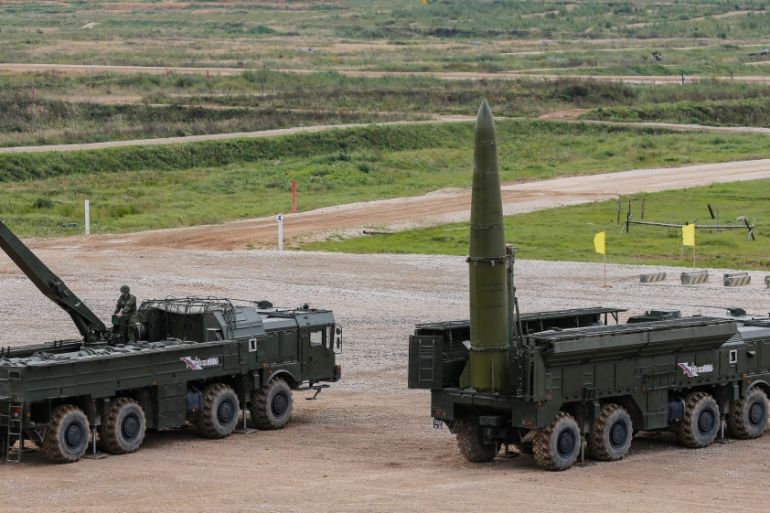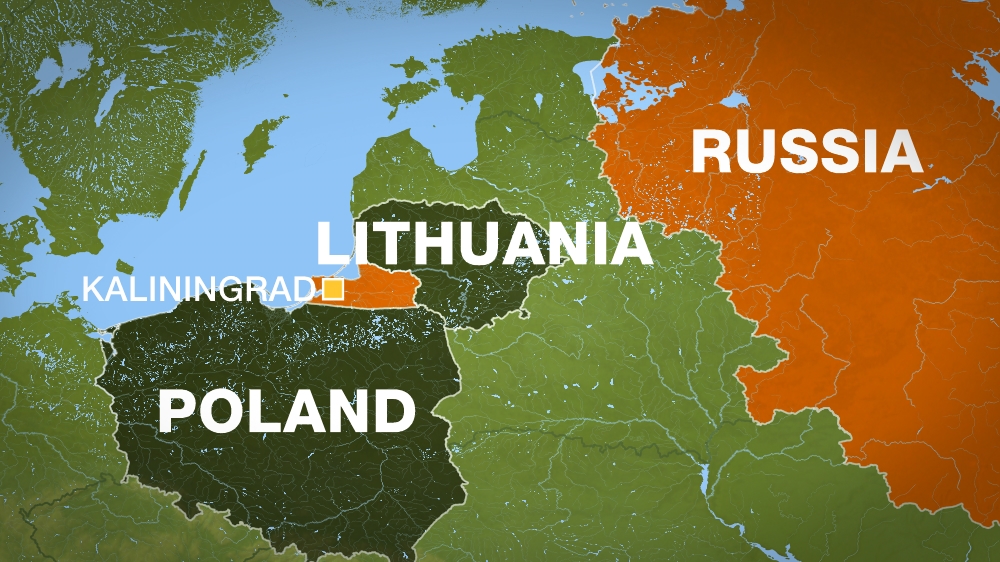Russia moves nuclear-capable missiles to NATO doorstep
Poland and Lithuania express concern as Russia deploys nuclear-capable ballistic missiles to Kaliningrad on Baltic Sea.

Lithuania and Poland have expressed concerns as Russia confirmed the deployment of nuclear-capable Iskander missiles into its Kaliningrad outpost which borders the two NATO members.
The Polish government reacted angrily to Russia’s move, calling it “very alarming”, while Lithuanian officials said it could breach an international nuclear weapons treaty.
Keep reading
list of 4 itemsNATO allies must do more as Ukraine runs out of ammunition: Stoltenberg
Nordic tensions on the rise amid Russian anger over NATO accessions
Flag of NATO’s 32nd member, Sweden, raised at alliance’s headquarters
Linas Linkevicius, Lithuania’s foreign minister, said on Saturday that Russia was using the deployment “to seek concessions from the West”. Moscow’s move came amid heightened tensions between Russia and western countries over Syria.
“Russia is holding military exercises in Kaliningrad, and its scenario includes deployment of Iskander missile systems and the possible use of them. We are aware of it,” Linkevicius told AFP news agency.
|
|
Russian officials, however, dismissed the concerns, saying that “contingents of missile troops have been moved many times and will continue to be moved to Kaliningrad region as part of a Russian armed forces training plan”.
Kaliningrad is “not an exception” to drills conducted across the country, defence ministry spokesman Igor Konashenkov said in an emailed statement.
Konashenkov said that one Iskander was placed in the open to “confirm the parameters of operation” of a US intelligence satellite he alleged was flying overhead.
Wedged between Poland and Lithuania and the Baltic Sea, Kaliningrad is vital to Russia’s strategic position.
Separated from the Russian mainland by 700km, it is the westernmost part of Russia. It houses the Russian Baltic Fleet, as well as multiple land forces and an air force detachment with fighters, bombers and helicopters, as well as an early-warning radar system and other equipment.

Moscow sent Iskanders to Kaliningrad in 2015 during a series of massive military drills as tensions with the West reached their worst point since the Cold War, triggered by Russia’s 2014 annexation of Crimea from Ukraine and its military campaign in Syria a year later.
The US on Friday called for Russia and Syria to be investigated for war crimes for the bombing of hospitals in Aleppo, and accused Moscow of trying to “interfere” with the American presidential election.
‘Divide, intimidate’
Judy Dempsey, a senior associate at Carnegie Europe, told AFP that Moscow’s latest Iskander deployment to Kaliningrad is “a way to divide the West”, just weeks before the US presidential election.
“These types of moves by Russia are making the Europeans and the US nervous. [Russian President Vladimir] Putin is pressing all the buttons,” Dempsey said.
“Tensions over Iskander have been going on for seven years. It’s a very tried way to pressure the West.
“The latest events in Kaliningrad are a way to intimidate the Baltics and Poland,” she added.
|
|
Michal Baranowski, Warsaw office director of the German Marshall Fund of the US, said the Iskander deployment is “obviously an openly aggressive move, but it isn’t something that would require an immediate response from NATO – it fits the previous pattern.
“I would be much more worried if Moscow were to deploy greater conventional forces to Kaliningrad,” he told AFP on Saturday.
Vilnius University analyst Laurynas Jonavicius, however, increased the sabre-rattling by saying “revisionist Russia” raises the risk of incidents in the Baltic region which could prompt a major crisis.
Meanwhile, Lithuanian intelligence warned earlier this year that Iskanders deployed in Kaliningrad “may be used for hindering the actions of NATO’s allied forces in the region”.
Since the start of the Ukraine crisis in 2014, Russia has flexed its muscles with a series of war games involving tens of thousands of troops in areas bordering NATO Baltic states.
NATO responded by agreeing to deploy four battalions in Poland, Lithuania, Latvia and Estonia as of next year to bolster its eastern flank.